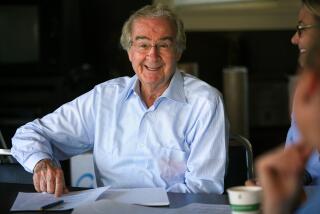Charles E. Wyzanski Jr. Noted for Controversial Rulings : Jurist Who Emphasized Civil Rights Dies
- Share via
CAMBRIDGE, Mass. — U.S. District Judge Charles E. Wyzanski Jr., a champion of civil liberties known for his controversial rulings on conscientious objectors and the Vietnam War, has died at age 80.
Wyzanski, who suffered a cerebral hemorrhage Sunday and died Wednesday, was appointed to the federal bench in 1941 by President Franklin D. Roosevelt. He was 35 at the time, one of the youngest men ever appointed to the post.
As senior judge from 1971 until his death, Wyzanski sat in U.S. District Courts in Boston and San Francisco and in U.S. Courts of Appeal in Chicago, New York, Richmond and Washington.
After presiding at the 1960-61 trial of a man accused of bribing state officials, Wyzanski criticized the public for not demanding a higher standard of integrity in public officials.
“I am deeply conscious of my own inadequacies of character and temperament,” he wrote in 1965. “Members of Congress as well as appellate courts have justly noted occasions when I have been arbitrary--and I would add conceited.”
In 1969, he recognized the right of non-religious conscientious objection in a ruling in a Selective Service case. He said the 1967 Selective Service Act was unconstitutional because it discriminated against “atheists, agnostics and men who are motivated by profound moral beliefs.”
He also told a high school principal that he could not regulate the length of a male student’s hair, banished corporal punishment from Boston public schools and, in 1973, said the Vietnam War was conducted illegally after repeal of the Gulf of Tonkin resolution in 1971.
The Massachusetts House in 1973 voted 111-65 in favor of a resolution to have him step down from the bench. He did not.
“Civil liberties is not something the average person cares about except when his own ox is gored,” he once wrote. “I promise you if you put on any ballot the first 10 amendments or anything else which involves liberty, and you took a poll of the total electorate, there isn’t a single amendment that would pass.”
Wyzanski was born in Boston and was graduated from Harvard College in 1927 and from Harvard Law School in 1930. U.S. Supreme Court Justice Felix Frankfurter, who had taught Wyzanski at Harvard Law School, described him as “one of the most brilliant students I ever had.”
More to Read
Sign up for Essential California
The most important California stories and recommendations in your inbox every morning.
You may occasionally receive promotional content from the Los Angeles Times.









